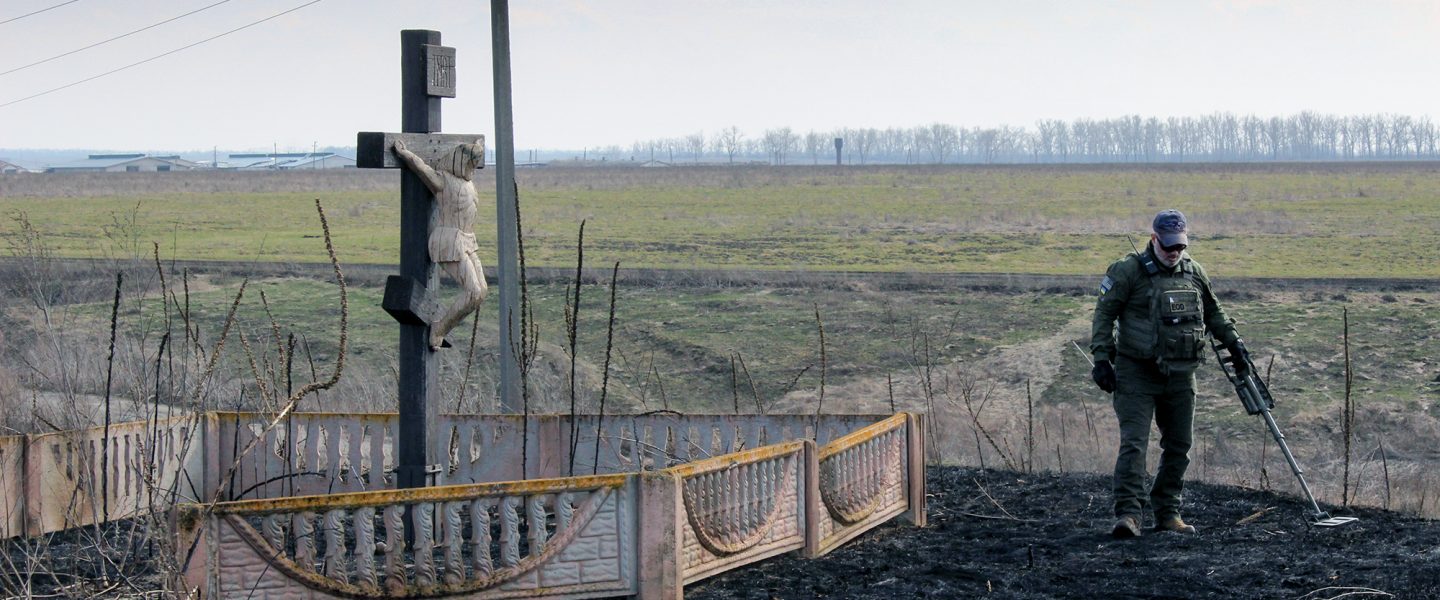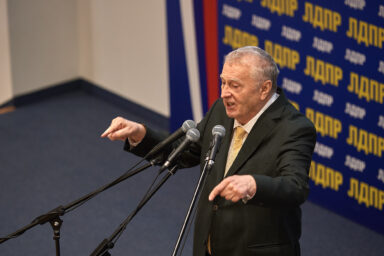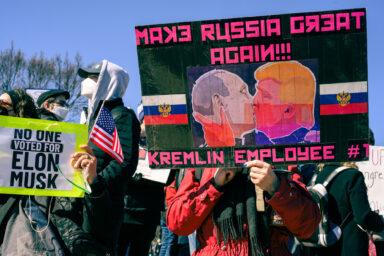Ukraine has more buried landmines, tripwires, and unexploded grenades than any other country in the world. US and British volunteers are helping to remove them.
|
Listen To This Story
|
VASYLENKOVE, Ukraine — Metal detector in hand, Trevor Kirton cautiously makes his way up a potholed dirt road outside the small village of Vasylenkove in eastern Ukraine. A couple hundred meters ahead, mangled metal and charred personal belongings are all that remain of a Ukrainian truck after it drove over a Russian antitank mine. According to locals, the vehicle’s occupants were killed instantly. There is one torn camouflage vest lying by the side of the road.
“Try and follow in my footsteps,” says Kirton, a former service member in the British army, as he crouches to examine a piece of shrapnel. On a hill overlooking the wreckage, a wall of flame is slowly creeping down towards the road, lending an apocalyptic atmosphere to this scene.
In Ukraine, late March is the time of the year when farmers set fire to their fields, a cheap — if not environmentally sound — way of quickly removing weeds and crop residue prior to sowing. “It’s not a bad thing actually, as it destroys tripwires and makes landmines and explosives easier to spot,” says Kirton, gesturing towards the fire. As he trails off the dirt road into a nearby bog, an explosion sends a plume of thick black smoke rising over the horizon — a reminder that landmines aren’t the only threat to worry about in Vasylenkove. Kirton pauses for a second, unbothered, before resuming his work.

Liberated by the Ukrainian army during its lightning-fast September counteroffensive, this small village in the Kharkiv region was occupied for more than six months by Russian regulars and ill-equipped soldiers of the self-proclaimed Donetsk and Luhansk People’s Republics. In the months leading up to the Ukrainian breakthrough, the occupiers built an extensive, if somewhat shoddy, network of trenches and dug-outs around Vasylenkove. At the same time, the Russian troops littered the area with countless landmines, tripwires, and undetonated grenades. Now, with the overworked deminers of the State Emergency Service of Ukraine (SESU) stretched thin, it falls to volunteers like Trevor, Chris, and Stuart — the Explosive Ordnance Disposal (EOD) technicians of the US-based nonprofit Sons of Liberty International (SOLI) — to locate and remove them.
Founded in 2015 by American former journalist Matthew VanDyke, who rose to fame while fighting on the side of the rebels during the Libyan Civil War, SOLI’s stated purpose is to provide security consulting and training to populations struggling against dictatorships or terrorist groups. Since the very first days of the Russian invasion of Ukraine, the organization claims to have trained more than a thousand soldiers — from the inexperienced volunteers of the Territorial Defense Force to the seasoned operators of the Ukrainian Special Forces. The training dispensed by SOLI’S instructors — most of them American, and all of them veterans — runs the gamut from close-quarter combat to tactical medicine.

SOLI has also worked with Christian and Sunni militias struggling against ISIS in Iraq; pro-democracy rebels facing the Myanmar military junta; and military forces battling the Islamic insurgency in the Philippines. While this list is wide-ranging, VanDyke says that all of these operations have a common thread. “Many of the dictatorships and terrorist groups that we have struggled against have been supported, in one way or another, by Russia,” he says, clutching the wheel of his Toyota Hilux pickup. “This is an opportunity to take the fight to them, and end it once and for all.”
As VanDyke and his team pull up on a side road in Senkove, a leafy village on the banks of the Oskil River, a woman comes out of her house to greet them. “When is it going to be removed?” she asks, gesturing toward a SMERCH rocket planted in the ground, yards away from her front door. Scores of Russian missiles were fired at Senkove at the height of the fighting, in mid-September, and most of them remain buried in gardens or, in some cases, lodged in the walls or ceilings of peoples’ homes. Overwhelmed with calls, the local SESU has so far been unable to remove or destroy these missiles.

SOLI’s demining operation in Ukraine is only about six weeks old, and communication with the regional emergency services is patchy at best. SOLI’s technicians lack the explosives available to SESU to safely detonate the landmines they removed in Vasylenkove, so they have resorted to shooting at the landmines with a US-made M-14 rifle.
VanDyke would like to expand the scope of SOLI’s EOD operation in Ukraine, but he concedes that the funds at his disposal are limited. A nonprofit, SOLI relies on donations and, occasionally, on VanDyke’s own money. The organization provides the equipment for this nascent EOD operation in Ukraine, and covers the technicians’ travel and living expenses, but Trevor, Stuart, and Chris are not getting paid for this dangerous work. “We do what we can,” says Stuart, a veteran of the wars in Iraq and Afghanistan, “so that people here can tend to their garden or walk down the street without having to fear being killed or maimed.”

Before coming to Ukraine, Stuart worked extensively in Africa, the Middle East, and Asia, both as a defense contractor and as a service member in the US Army. He says that the scale of the destruction he encountered in Ukraine is unlike anything he has seen before. “This is an industrial, large-scale war,” Stuart says. “It’s going to take years, if not decades, to demine the country.”
Despite their supply limitations, Stuart, Chris, and Trevor have managed to sweep 25 acres of land in Vasylenkove in the last month. They have removed more than 60 landmines, a number of undetonated grenades, and the frames of two cluster munition rockets. Their efforts are undermined with each new day of fighting, however, as countless more mines, shells and unexploded ordnance further contaminate the land of Ukraine. An estimated 174,000 square kilometers (~67,180 square miles) have already been polluted by the explosive remnants of Russia’s invasion, according to the Ukrainian Ministry of Foreign Affairs. This makes Ukraine the most mine-strewn country in the world — before Syria and Afghanistan.




